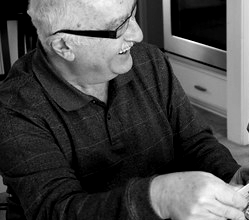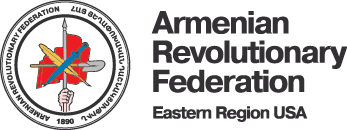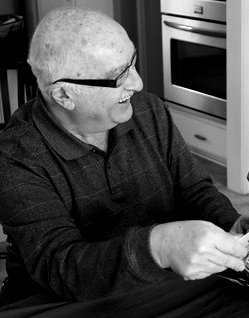Finding Meaning in My New Reality

Editor’s note: Columnist Tom Vartabedian has been diagnosed with cancer. This is the second in a series of columns about his treatments and other experiences related to the disease that will appear occasionally in the Haverhill Gazette, where Vartabedian worked for decades. The Armenian Weekly will share these columns with its readers.
I don’t have time to die—at least not yet!
Who will continue writing this column, which has been my ritual for the past 46 years? When any situation was bleak, I would often conquer it with a little humor. Words, my friend, are often the most effective medium.
Who will look after my six grandchildren and offer them grandparental vision? Somehow, “papas” are one of kind—softhearted and generous with their time. I may not see them graduate high school, let alone attend their college commencements and weddings as I had hoped.
Who will teach my Armenian School classes at church, a commitment I’ve kept for the past 45 years? Upon learning the news, my students look at me now with sympathy, but not pity.
Who will visit the schools of the Merrimack Valley, offering human rights and genocide education to students who are part of a restless society? It’s been my mantra the past seven years and I’ve gained my inspiration from it.
Who will open my summer camp and close it down in the fall, laying out the welcome mat as it has been since 1970? The big fish that keeps eluding me year after year has gotten a sudden reprieve.
And who will look after by beloved wife of 51 years and watch my very own children through their parenting years?
The diagnosis came Feb. 12, a week after my first and only book was published. I had worked the summer through on a project that ultimately became a mission, The Armenians of Merrimack Valley, co-authored by E. Philip Brown, a social studies teacher at Haverhill High.
We collaborated for two reasons—he for his thesis to earn a Master’s degree and me to calculate and record a history of my ethnic origin over the past 100 years.
The work was to accentuate a milestone in my heritage—the 100th anniversary of the Armenian Genocide—which resulted in the massacre of 1.5 million Armenians and drove another million from their homes into obscurity.
One of my sons flew here from a business trip in the Midwest to join our family at Dana Farber in Boston. The news was not good. Level 4 gastrointestinal cancer. A tumor had lodged itself in the bile duct and was inoperable.
Five years prior, I survived triple bypass surgery. Would I be so fortunate once again?
After being tested locally, my family suggested Dana Farber, where we found an oncologist who specializes in this type of cancer. He was more than sympathetic to my needs.
“Stay positive,” he said. “Keep your glass always half full. Continue your everyday lifestyle and grow buoyant with your lifeline of family and friends. In the end, it’s your loved ones who will motivate you through this ordeal.”
Words to live by, not succumb to, I reminded myself.
In an effort to become closer to God and my church, I joined the choir. I was a 75-year-old, raspy baritone surrounded by gifted singers chanting a classical service that dates back 1,700 years. With my back to the congregation, who would notice a breakdown?
My first day in the infusion room was an experience. After having blood work done, vitals taken and a meeting with the oncologist, inside a cubical I went for my initial dose of chemo. A port had been installed into my shoulder blade to facilitate the IV.
“Welcome to the family,” my nurse chirped. “There are no strangers here.”
The four-hour IV treatment was not without visitors. First came the chaplain, followed by a social worker, a library on wheels, and finally the lunch wagon. I was in good company.
I began giving this ordeal a lot of thought. Why me? What did I do to deserve this? Yes, my dad was a cancer victim. So were many others close to home.
How many stories had I written over my 50 years with the Gazette about those afflicted with cancer? How many funerals? But yes, there are the inspirational cases where remission enters the picture. You hope for a miracle, even with terminal cases.
I made it a point during my storied career to plug the Relay for Life cancer walk at Northern Essex Community College, write stories that served to motivate, not discourage.
One of them on Jarred Tuccolo, a Whittier Regional High student, earned me a coveted Sword of Hope Award from the American Cancer Society. Jarred accompanied me at the presentation.
Upon the suggestion of my oncologist and those in the writing community, I embraced the idea to write a series of occasional columns, not a pity party, but to give you, the reader, some glimmer of hope and assurance should you be facing a similar obstacle.
There is not one of us who hasn’t been impacted by cancer. The disease is running rampant in our society with cures still in the nebulous stages. And now it had found me.
After my first round of treatment, I paid a visit to the Dana Farber Healing Garden—a rain forest setting with soft music, fountains, and exotic plants.
A pianist in the lobby below was playing Broadway show tunes and suddenly went into a children’s song, “The Farmer in the Dell.” Laughter abounded.
I glanced downward and there before me was a child of 8 or 9, tumbling with her dad in cadence with the music. She was wearing a pink cap over her head.
Cancer knows no distinction, no age or lifestyle. I had suddenly come to terms with reality.
Source: Armenian Weekly Mid-West

